Determination of the Main Socio-Economic Factors of the Sustainable Production of Forage Crops: Research of Kayseri Province
IF 0.7
Q3 AGRICULTURE, MULTIDISCIPLINARY
引用次数: 2
Abstract
Today, about 21% of the Turkey’s population lives engage plant production and animal husbandry; the most crucial aspect of livestock breeding is producing forage crops. Since 2000, growers in Turkey have been subsidized and encouraged to increase both their production and quality of forage crops. However, despite all this support and assistance, desired production levels have not yet been achieved. Therefore, it is equally crucial analyze the effects of factors other than the subsidies provided on forage crops production. This study aims to determine the socio-economic factors that affect sustainable forage crops production. The study was carried out in the province of Kayseri, specifically in 11 villages where both plant production and animal husbandry systems are common. The subjects of the study were selected through the Random Sampling Method and data was collected by surveying 310 forage crops growers. To identify dependency relationships between qualitative variables used mainly based on a statistical chi-square statistic. According to the analysis results, 35.5% of growers found forage crops production sustainable, whereas 64.5% of them thought that it was unsustainable. When both socio-economic variables and the answers to survey questions were taken into account, variables such as grower’s age, education level, income level, land for fodder crops, livestock count, recent increase in livestock count, subsidies, and the conditions under which sustainability may be maintained were found to be related to forage crops production sustainability.饲料作物可持续生产主要社会经济因素的确定——以开塞利省为例
今天,土耳其约21%的人口从事植物生产和畜牧业;家畜养殖最关键的方面是生产饲料作物。自2000年以来,土耳其一直在补贴和鼓励种植者提高饲料作物的产量和质量。然而,尽管有所有这些支持和援助,期望的生产水平尚未达到。因此,分析除补贴以外的其他因素对饲料作物生产的影响同样至关重要。本研究旨在确定影响可持续饲料作物生产的社会经济因素。这项研究是在开塞利省进行的,特别是在植物生产和畜牧业系统都很普遍的11个村庄。采用随机抽样法选取研究对象,对310名饲料作物种植户进行调查。为了确定定性变量之间的依赖关系,主要使用基于统计卡方统计的方法。分析结果显示,35.5%的农户认为饲料作物生产是可持续的,而64.5%的农户认为饲料作物生产是不可持续的。当考虑到社会经济变量和调查问题的答案时,发现诸如种植者年龄、教育水平、收入水平、饲料作物土地、牲畜数量、最近牲畜数量的增加、补贴以及可能维持可持续性的条件等变量与饲料作物生产的可持续性有关。
本文章由计算机程序翻译,如有差异,请以英文原文为准。
求助全文
约1分钟内获得全文
求助全文
来源期刊

Journal of Agricultural Sciences
AGRICULTURE, MULTIDISCIPLINARY-
CiteScore
1.80
自引率
0.00%
发文量
0
 求助内容:
求助内容: 应助结果提醒方式:
应助结果提醒方式:


